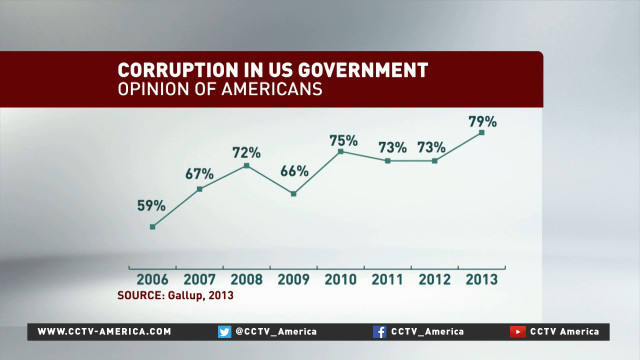The Founding Fathers of the United States, prominent statesmen of the American Revolution, tried to create a government that would put checks and balances on the excesses of human nature including corruption. Nearly 250 years later, it hasn’t always worked out.
CCTV America’s Nathan King reported this story from Washington, D.C.
Follow Nathan King on Twitter@nathanking

The administration of civil war hero Ulysses S. Grant was considered one of the most corrupt ever in US history; Spiro Agnew, President Nixon’s Vice President, was accused of graft and forced to resign, and more recently, Former Representative Jesse Jackson Jr., the son of the civil rights hero, was jailed for illegally spending campaign money on himself.
“Taking bribes, accepting money they shouldn’t be accepting, some lesser some more serious but definitely even at the highest levels of the U.S. government including Congress, there are recent examples of practices that are taking place not the norm but if definitely does happen,” Dave Levinthal of The Center for Public Integrity said.
One of the reasons corruption may not be the norm here in Washington is what might be considered corrupt in other parts of the world is perfectly legal here in the U.S. capital. K street, the center of a vast lobbying industry, where special interest groups accept money from businesses and unions for the purpose of influencing lawmakers.
Hundreds of millions of dollars are spent each year in Washington by lobbying firms that often employ former lawmakers.
Nearly half of all U.S. members of congress leave office and become lobbyists many trying to influence their former colleagues on someone else’s behalf.
In 2010, the U.S. Supreme court ruled in a case called Citizens United that corporations and unions could spend unlimited amounts of money on election campaigns either supporting or campaigning against candidates.
Recently, the billionaire industrialists the Koch brothers announced they intend to raise and spend $900 million for the 2016 election to bank roll conservative candidates.
Lesser funded but well organized unions will back more liberal candidates.
These developments have led to a sharp decline in public trust of the U.S. government.
When asked whether the government is corrupt in 2013, 79 percent of people surveyed said yes, a 20 percent increase from only seven years earlier.
Since 1964, the number Americans who believe government is run for the interests of a few has skyrocketed from 29 percent to 79 percent, while those who think the U.S. government exists for the benefit of the people dropped from 64 percent in 1964 to 19 percent in 2012.
“Right now, there is a major war going on – a war of ideas, a war of ideology between those who believe that legalized corruption in place in our elections in the United States, and those who feel that the first amendment to the constitution the one that gives you the right to speak freely without restrictions by the government, that’s more important ..really there is no firm answer right at this point to where this is going to go in the next few years,” Levinthal said.
For now, the practice of spending money on elections and spending money to influence lawmakers is considered free speech not corruption. This makes elections in the U.S. expensive. An estimated $7 billion was spent on the 2012 presidential campaign, and U.S. congressional races.
While it may be legal, many feel the principle of one man/one vote is drowned out by the influence of an unlimited amount of dollars.
Victor Gao, Chairman, China Energy Security Inst. on China corruption
CCTV America’s Elaine Reyes interviewed current affairs commentator and international relations analyst Victor Gao. He discussed China’s anti-corruption campaign.

 CGTN America
CGTN America
